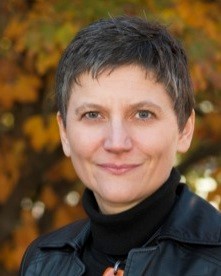Important Notice
Due to the Covid-19 outbreak, EGPGV 2020 will now be an online event.
EuroGraphics Symposium on Parallel Graphics and Visualization - Norrköping, Sweden

Due to the Covid-19 outbreak, EGPGV 2020 will now be an online event.
Keynote Speaker:
Dr. Michela Taufer, University of Tennessee Knoxville
Co-presented by:
Molecular dynamics (MD) simulations studying the classical time evolution of a molecular system at atomic resolution are widely recognized in the fields of chemistry, material sciences, molecular biology and drug design; these simulations are one of the most common simulations on supercomputers. Today MD simulations are the most common simulations running on petascale machines. A survey of resources used on XSEDE machines over the past six months shows how biomolecular codes (predominantly MD codes such as Amber, CHARMM, and NAMD) use 25.7% of the XSEDE resources (i.e., total amount of XD service units (SUs) used by jobs in the field of science indicated). At the same time, work of Luu and co-authors show how HPC computing resources already can be up to 75% idle performing I/O operations while running scientific simulations because of poor data handling. Next-generation supercomputers will have dramatically higher performance than current systems, generating more data that needs to be analyzed (i.e., in terms of number and length of molecular dynamics trajectories). The coordination of data generation and analysis cannot rely on manual, centralized approaches as it does now.
This talk presents an interdisciplinary project integrating research from various areas across programs such as computer science, structural molecular biosciences, and high performance computing to transform the centralized nature of the molecular dynamics analysis into a distributed approach that is predominantly performed in situ. Specifically, the effort presented in this talk combines machine learning and data analytics approaches, workflow management methods, and high performance computing techniques to analyze molecular dynamics data as it is generated, save to disk only what is really needed for future analysis, and annotate molecular dynamics trajectories to drive the next steps in increasingly complex simulations’ workflows. The project’s harnessed knowledge of molecular structures’ transformations at runtime can be used to steer simulations to more promising areas of the simulation space, identify the data that should be written to congested parallel file systems, and index generated data for retrieval and post-simulation analysis.
 Michela Taufer is an ACM Distinguished Scientist and holds the Jack Dongarra Professorship in High Performance Computing in the Department of Electrical Engineering and Computer Science at the University of Tennessee Knoxville (UTK). She earned her undergraduate degrees in Computer Engineering from the University of Padova (Italy) and her doctoral degree in Computer Science from the Swiss Federal Institute of Technology or ETH (Switzerland). From 2003 to 2004 she was a La Jolla Interfaces in Science Training Program (LJIS) Postdoctoral Fellow at the University of California San Diego (UCSD) and The Scripps Research Institute (TSRI), where she worked on interdisciplinary projects in computer systems and computational chemistry. Taufer has a long history of interdisciplinary work with scientists. Her research interests include software applications and their advanced programmability in heterogeneous computing (i.e., multi-core platforms and GPUs); cloud computing and volunteer computing; and performance analysis, modeling and optimization of multi-scale applications. She has been serving as the principal investigator of several NSF collaborative projects. She also has significant experience in mentoring a diverse population of students on interdisciplinary research. Michela’s training expertise includes efforts to spread high-performance computing participation in undergraduate education and research as well as efforts to increase the interest and participation of diverse populations in interdisciplinary studies.
Michela Taufer is an ACM Distinguished Scientist and holds the Jack Dongarra Professorship in High Performance Computing in the Department of Electrical Engineering and Computer Science at the University of Tennessee Knoxville (UTK). She earned her undergraduate degrees in Computer Engineering from the University of Padova (Italy) and her doctoral degree in Computer Science from the Swiss Federal Institute of Technology or ETH (Switzerland). From 2003 to 2004 she was a La Jolla Interfaces in Science Training Program (LJIS) Postdoctoral Fellow at the University of California San Diego (UCSD) and The Scripps Research Institute (TSRI), where she worked on interdisciplinary projects in computer systems and computational chemistry. Taufer has a long history of interdisciplinary work with scientists. Her research interests include software applications and their advanced programmability in heterogeneous computing (i.e., multi-core platforms and GPUs); cloud computing and volunteer computing; and performance analysis, modeling and optimization of multi-scale applications. She has been serving as the principal investigator of several NSF collaborative projects. She also has significant experience in mentoring a diverse population of students on interdisciplinary research. Michela’s training expertise includes efforts to spread high-performance computing participation in undergraduate education and research as well as efforts to increase the interest and participation of diverse populations in interdisciplinary studies.
Session Chair: Kurt Debattista, University of Warwick, United Kingdom
Paper Chair introduction to program
Finding Efficient Spatial Distributions for Massively Instanced 3-d Models
Fast Multi-View Rendering for Real-Time Applications
Moment-Based Opacity Optimization
Session Chair: Benjamín Hernández, Oak Ridge National Laboratory, United States
Improving Performance of M-to-N Processing and DataRedistribution in In Transit Analysis and Visualization
Effective Parallelization Strategies for Scalable, High-Performance Iterative Reconstruction
Approaches for In Situ Computation of Moments in a Data-Parallel Environment
Session Chair: Shaomeng Li, National Center For Atmospheric Research, United States
High-Quality Rendering of Glyphs Using Hardware-Accelerated Ray Tracing
Alternative parameters for On-The-Fly Simplification of MergeTrees
Panel Discussion (How Ubiquitous Parallel Devices Affect Visualization)
Keynote: Michela Taufer, University of Tennessee, USA
Best Paper Award and Closing Remarks